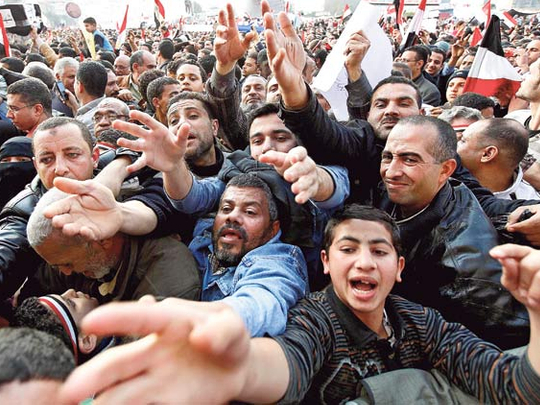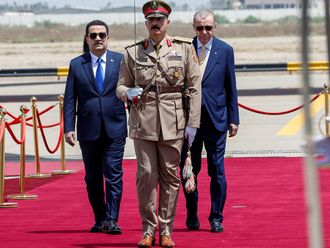
Dubai: For the first time, Egyptian labour unions have gone on a nationwide strike, adding momentum to pro-democracy demonstrations in Cairo and other cities.
Around 20,000 factory workers stayed away from work on Wednesday, demanding raise in salaries, Al Jazeera reported.
Anti-government activists also called on supporters to expand their demonstrations in defiance of the vice-president’s warning that protests calling for President Hosni Mubarak’s ouster would not be tolerated for much longer.
Vice-President Omar Sulaiman, who is managing the crisis, raised the prospect of a new crackdown on protesters when he told Egyptian newspaper editors there could be a "coup" unless demonstrators agree to enter negotiations.
Although it was not completely clear what the vice-president intended in his “coup” comment, the protesters heard it as a veiled threat to impose martial law - which would be a dramatic escalation in the standoff.
Sulaiman, a military man who was intelligence chief before being elevated to vice president amid the crisis, tried to explain the remark by saying:
“I mean a coup of the regime against itself, or a military coup or an absence of the system. Some force, whether its the army or police or the intelligence agency or the [opposition Muslim] Brotherhood or the youth themselves could carry out ‘creative chaos’ to end the regime and take power,” he said.
Sulaiman, a close confidant of Mubarak, also reiterated his view that Egypt is not ready for democracy.
“The culture of democracy is still far away,” he told state and independent newspaper editors in the roundtable discussion Tuesday.
However, defiant organisers of the mass demonstrations, now in their 16th day, called for a new “protest of millions” for Friday. But in a change of tactic, they want to spread the protests out around different parts of Cairo instead of only in downtown Tahrir Square, said Khalid Abdul Hamid, one of the youth organisers. Yesterday protests were also held at parliament building in Cairo.
“He [Sulaiman] is threatening to impose martial law, which means everybody in the square will be smashed,” said Abdul Rahman Samir, a spokesman for a coalition of the five main youth groups behind protests in Cairo’s Tahrir Square.
“But what would he do with the rest of the 70 million Egyptians who will follow us afterward.”
Sulaiman is creating “a disastrous scenario,” Samir said. “We are striking and we will protest and we will not negotiate until Mubarak steps down. Whoever wants to threaten us, then let them do so,” he added.
Thousands of protesters chanting “we are not leaving until he leaves” camped overnight in Tahrir Square in tents made with plastic tarps and bed covers to protect them from chilly weather, sprawling out into sidestreets. Many have been sleeping underneath the tanks of soldiers surrounding the square to prevent the vehicles from moving or trying to clear the area for traffic.
Others started to flow into Tahrir on Wednesday morning, some welcomed with sweets by those who spent the night. The demonstrations have paralysed the area around the square, defying the government’s efforts to restore a sense of normalcy as the uprising enters its third week.
Meanwhile, in Al Kharga, a town in southern Egypt’s New Valley region, at least three people were killed and 100 wounded in two days of clashes between police and demonstrators, a security official said on Wednesday.
The furious mob responded by burning seven official buildings, including two police stations, a police barracks, a court house and the local headquarters of President Hosni Mubarak’s ruling National Democratic Party.
US Vice-President Joe Biden spoke by phone with Sulaiman on Tuesday, saying Washington wants Egypt to immediately rescind emergency laws that give broad powers to security forces a key demand of the protesters.
Meanwhile, Egypt’s most famous tourist attraction, the Pyramids of Giza, reopened to tourists on Wednesday. Tens of thousands of foreigners have fled Egypt amid the chaos, raising concerns about the economic impact of the protests.











